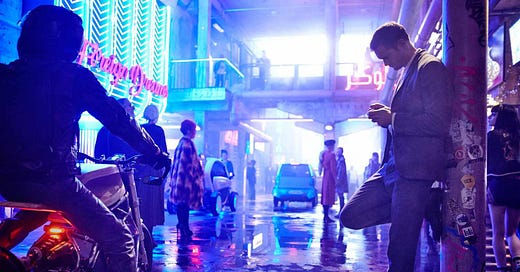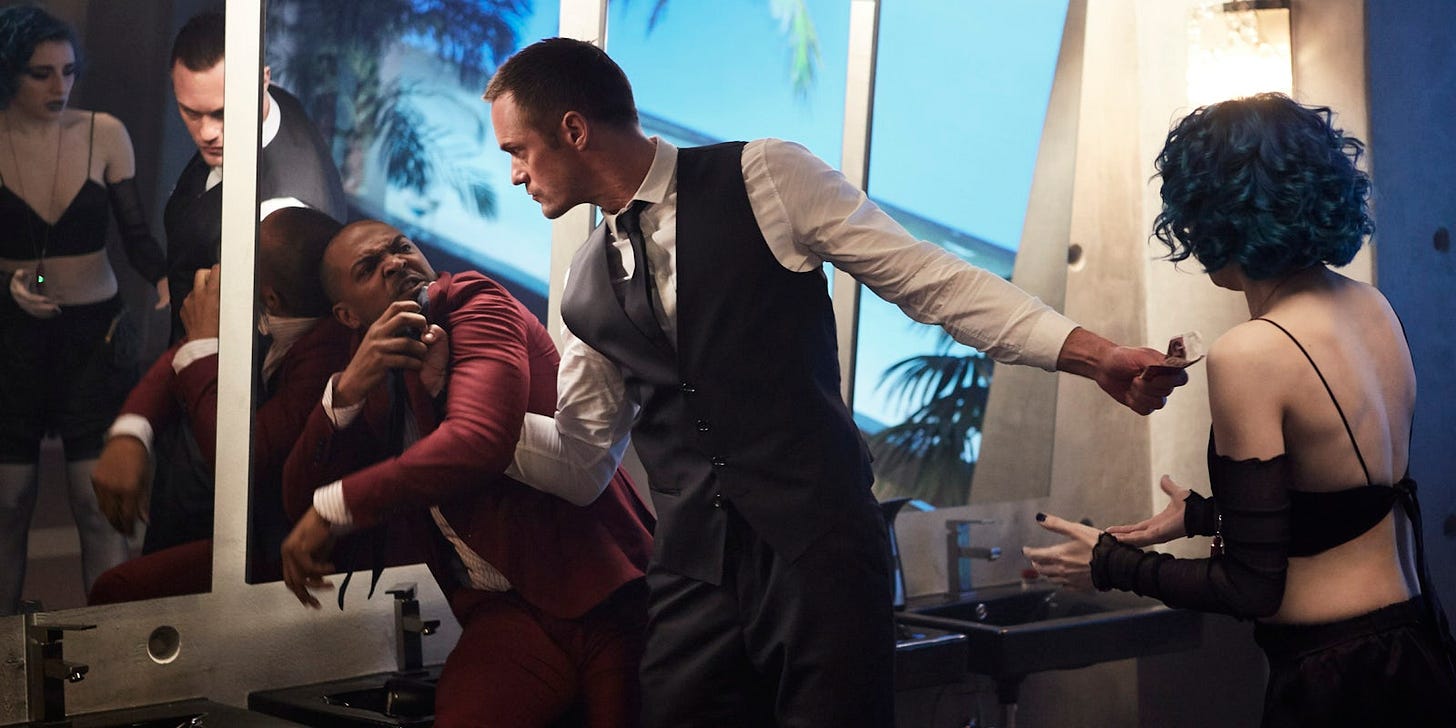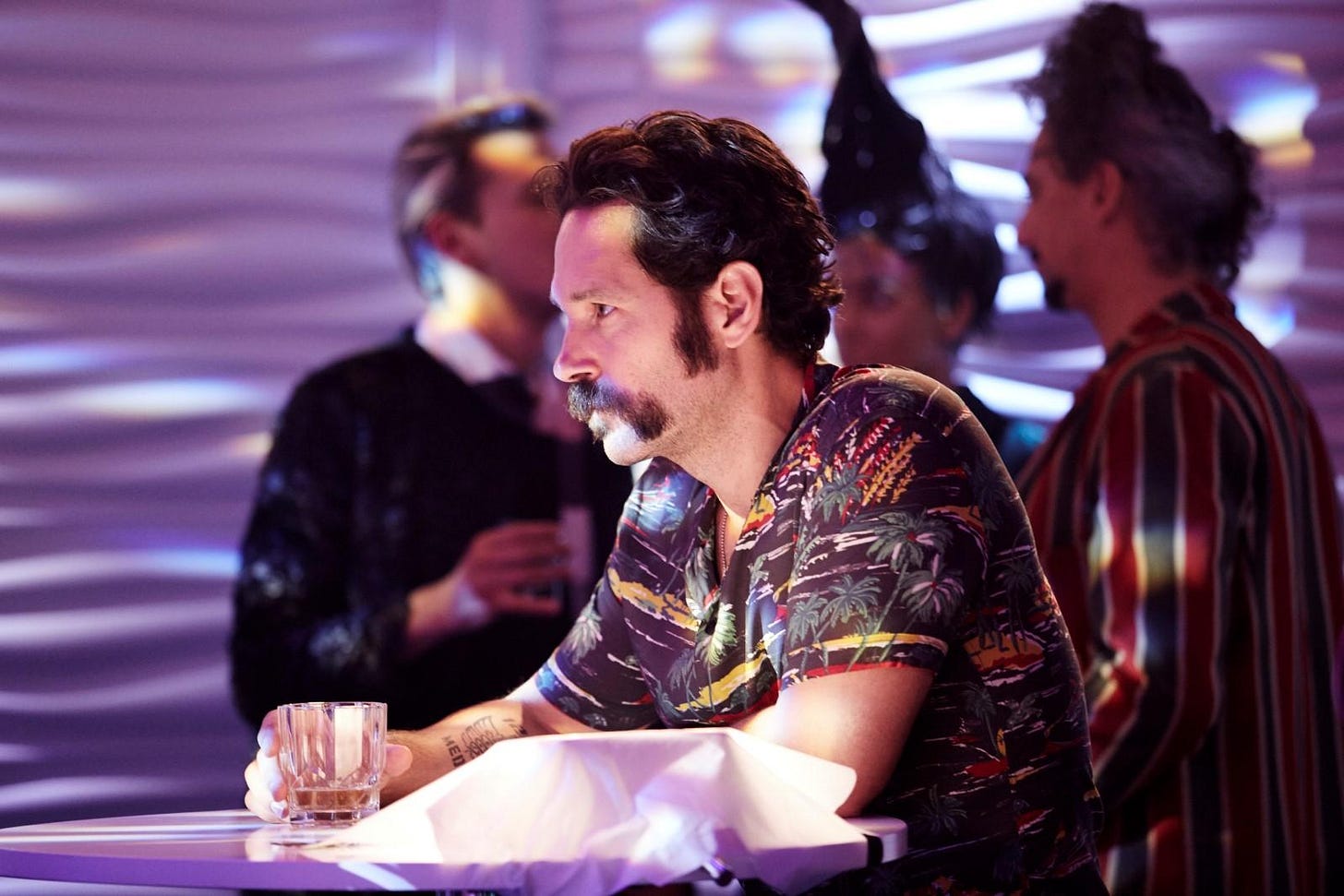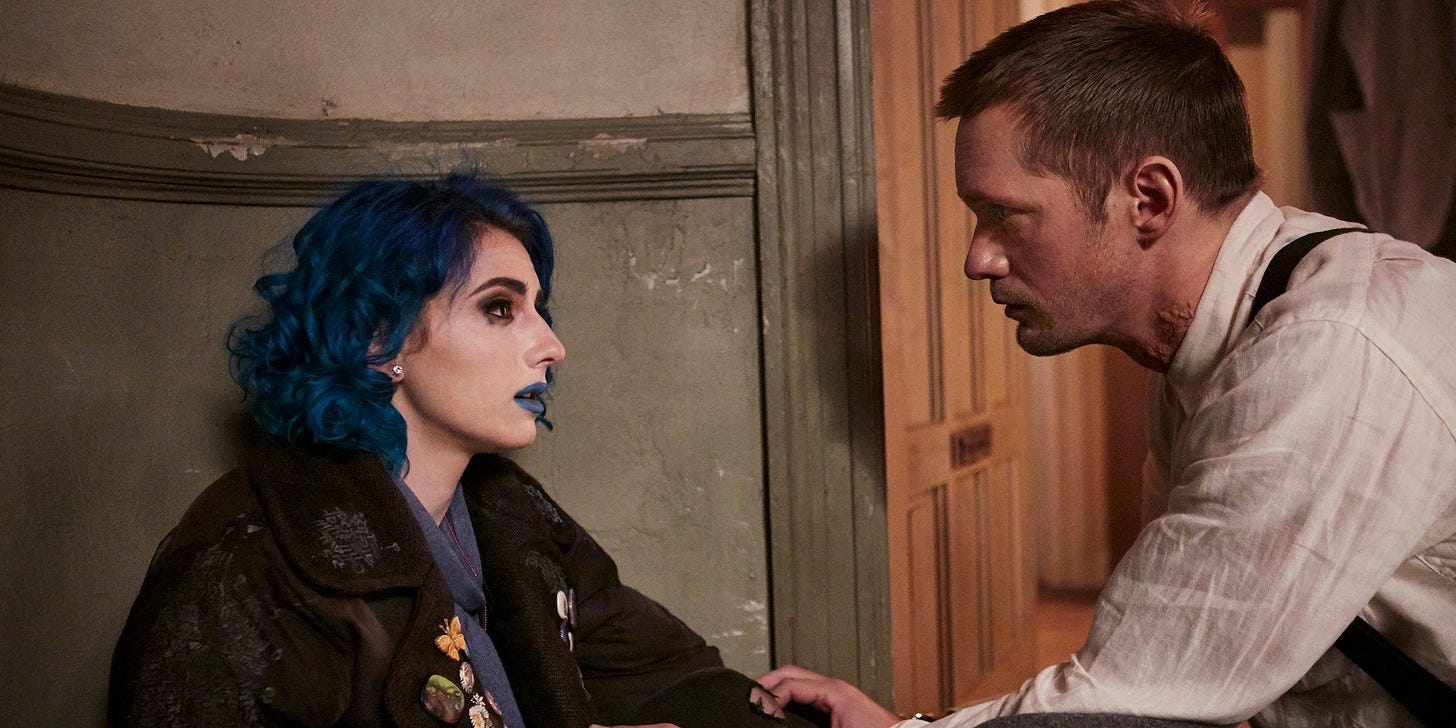I spent years waiting for “Mute”. Shortly after 2009’s “Moon”, Duncan Jones was crowing about this “Blade Runner”-esque script he was tossing around Hollywood. What was most enticing to me was that firstly, his claim was that it was too expensive to make, the kind of hype that never turns out well in retrospective. And secondly, his reveal that “Mute” happened within the world of “Moon”. For those of you who remember, “Moon” was a tricksy sci-fi tale of a man (Sam Rockwell, charming as all get-out) toiling away in a menial job on the lunar surface when he learns that his employer hasn’t been forthcoming about his circumstances. The idea that another movie might explore a little bit about that company and their role on a vastly different future Earth was an enticing easter egg all “Moon” fans (really not that many of us – maybe 100?) wanted to pursue.
And then the rest of Jones’ career happened. “Source Code” was a charming mindbender that featured several exciting set pieces – having been released thirteen years ago, it may be one of the last great mid-budgeted sci-fi movies to come out of the studio system [citation needed]. But then Jones took the money to make “Warcraft”. Having not followed the videogame, I found the movie utterly incomprehensible. The most interesting character was the CGI orc, and the CGI orc was maybe interesting for two minutes. I felt embarrassed for Paula Patton’s Party City fake-teeth, I felt embarrassed for the wizard dialogue Ben Foster spoke through gritted teeth, And Travis Fimmel’s… well, no. Whatever Travis Fimmel was trying to do was pretty on-brand for him, given that he was likely taking yet another role Charlie Hunnam had passed on.
Fortunately, the streaming age arrived, and suddenly Netflix led the way for all these new players in Hollywood to toss money at ideas the major studios already rejected. And this is how Netflix got to make “Mute”, a sci-fi noir that is indebted to “Blade Runner” but also features enough original material to make it noteworthy. Oh boy, I wish I liked it so much more.
Alexander Skarsgaard stars as Leo, a mute bartender in Germany, 2035, serving drinks to rich yuppies while wearing that classic Skarsgaard forlorn face. He has a girlfriend at the start of the movie, but is blindsided when she goes missing before getting to reveal a key bit of helpful plot information to him. Immediately, he hits the streets to find her, launching into a local gang tiff. Because of what we know about this genre, much of the suspense is derived from the tropes we know from this genre. Is his girlfriend dead? Was she hiding out under a different identity? Is it possible she was a robot? Did she have a twin sister? You’ll entertain all these notions and more before you get to the solution. She’s a plot device, don’t overthink it.
Along the way we meet a gay couple who make a living through plastic, and maybe metallic, surgery. Justin Theroux and Paul Rudd, looking like two people who would never spend a single minute with each other, are Cactus Jack and Duck. Jack is fastidious and sterile, and Theroux wears a Paul Williams wig with authority. Rudd, who shot this in between “Ant-Man” movies, sports a wooly mustache and a date rape stubble and generally acts like a freshly-fired henchman. Jack and Duck have something to do with the murdered girl, but the movie toys with us by trying to depict them in a neutral light. They are a loving couple, at least in the first act, and their goal is to eventually obtain travel visas to leave Berlin. They’re having similar run-ins with the mob that Leo has, and yet you know Leo is going to end up face-to-face against these two, mostly because the three of them are by far the most recognizable actors in the movie.
A word about Rudd. Normally skilled at playing aw-shucks nice guys, his Duck is one of the most odious characters I’ve ever encountered in a big budget genre film. And that’s maybe not even considering the shocking fact about Duck we learn at the movie’s midpoint. I’m impressed Rudd can jump into the Marvel machine and then jump out to do something this dark and scummy. There’s none of that likability or winking irony you normally get from Rudd’s performances, this guy is a straight-on dirtbag. Sometimes, a movie features a disreputable person and you’re fascinated, you want to lean in, to know more about them. In regards to Duck, Rudd is bringing life to the kind of character you just want off the screen, via plane or train crash, or maybe just horrifying boating mishap. I’m sort of impressed. But once Duck settles into this movie, I just wanted to pluck him right out.
“Mute” is very much like most ineffective neo-noirs, as it clearly belongs in the “you could’ve just left a note” subgenre. So much of the runtime is taken up by flashbacks that provide no new information, since without his voice, Skarsgaard is not a compelling physical presence unless he’s beating on people (which, in fairness, happens quite a bit here). And you can see that ugly Netflix gloss in plenty of the “sets” and backdrops – there are practical elements that look fantastic, but a lot of the CGI and composite work is 2012-direct-to-DVD quality. Maybe Jones should have kept knocking on these studios’ doors, if only to avoid shots jacked wholesale from “Blade Runner” that somehow look that much worse than that then-40 year old movie.
Oh, and that whole “World Of ‘Moon’” thing? Sam Rockwell shows up on a TV screen in the back of another scene, basically pantomiming a jokey postscript to “Moon”. What a gyp.
This movie at least reminds me that if there’s any lesson valuable to learn when you go to prison is that silence is golden. Silence becomes your friend. There are entire ecosystems for you to absorb, a whole world of different inmates in different cars making different plans. And if you’re new, they’re all watching you. So watch them. Scope out the terrain. Keep your mouth shut. Even if you have people in prison with you, speak softly, and keep a low profile. Being new in that environment, no matter who you are, makes you vulnerable. If anyone needs to be thrown to the guards, it’s you.
When I endured a physical attack, all eyes were on me. The guys who beat me felt like I would say something to the guards. They wanted me to tough it out, walk off the jaw broken in two places, keeping me from chewing or breathing properly. When I went to medical and never came back, I know their antenna went up. And I’m certain they had people who could find me should it ever even seem that I snitched. So after I got surgery, and as I waited to be shipped to a new institution, I shut the hell up. I didn’t say anything. I grew a thick beard, and when I ended up in transit with complete strangers, they were terrified of me. A thick black beard, wide crazy eyes, and complete silence, coming from me, for months. It was like that for a long time in my new spot, and once I saw the look on everyone’s face, I knew, and they knew, that I feared nothing. All that simply from silence.








Can't wait to watch this one, even though I know from word of mouth that it isn't particularly good as a whole. I know you're not much of a podcast guy, but we covered MOON just a few weeks ago (https://wineand.substack.com/p/wine-andmovies-moon-2009-with-jessica) and a few fun facts:
-MUTE was Duncan's original screenplay, he wrote it before Moon, while still in film school.
-Duncan wanted Sam Rockwell to play the Paul Rudd character, but Rockwell wanted to be the Skarsgaard character! They couldn't see eye to eye on this, so Rockwell said to stay in touch if Duncan had anything else.
-Duncan went home and immediately started dreaming up a vehicle for Rockwell, as he was determined that Rockwell would star in his first feature film. Thus, Moon was born, as a sort-of prequel to Mute, and something he could make with a much more modest budget (~$5M).
-There's a third chapter to this loose "trilogy", a graphic novel called MADI: ONCE UPON A TIME IN THE FUTURE which again takes place in the same universe and takes place after Mute.
On a less fun note, sorry to hear about the physical violence and intimidation factor of prison culture. Silence really is the scariest thing - the most terrifying on screen villains aren't those who monologue but those who speak rarely, and quietly even then.